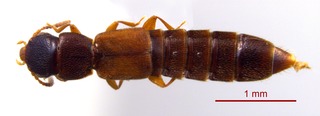| Steninae | |
|---|---|
 | |
| Stenus sp. | |
| Scientific classification | |
| Kingdom: | |
| Phylum: | |
| Class: | |
| Order: | |
| Family: | |
| Subfamily: | Steninae MacLeay, 1825 |
| Genera | |
Steninae is a subfamily of Staphylinidae. [1]
| Steninae | |
|---|---|
 | |
| Stenus sp. | |
| Scientific classification | |
| Kingdom: | |
| Phylum: | |
| Class: | |
| Order: | |
| Family: | |
| Subfamily: | Steninae MacLeay, 1825 |
| Genera | |
Steninae is a subfamily of Staphylinidae. [1]
Two genera, Dianous (2 spp.) and Stenus (167 spp.) in North America.

The rove beetles are a family (Staphylinidae) of beetles, primarily distinguished by their short elytra that typically leave more than half of their abdominal segments exposed. With roughly 63,000 species in thousands of genera, the group is currently recognized as the largest extant family of organisms. It is an ancient group, with fossilized rove beetles known from the Triassic, 200 million years ago, and possibly even earlier if the genus Leehermania proves to be a member of this family. They are an ecologically and morphologically diverse group of beetles, and commonly encountered in terrestrial ecosystems.

Stenus is a genus of semiaquatic rove beetles in the subfamily Steninae, and likely the largest genus in the kingdom Animalia, with some 3000 known species worldwide. They are known for swimming by emitting pygidial gland secretions that reduce surface tension and allow them to move on the surface of water.

The Paederinae are a subfamily of the Staphylinidae, rove beetles. The Paederinae include two tribes, Paederini and Pinophilini. This insect may refer to Tomcat.

The Euaesthetinae are a subfamily of the Staphylinidae (Coleoptera). These rove beetles have slender antennae with two or three apical antennomeres forming a loose club. The tarsi have 4-4-4 or 5-5-5 segments. They are found in forest litter. Five genera and 22 species known from North America.

The Leptotyphlinae are a subfamily of the Staphylinidae, rove beetles. They are very small, less than 1.8 mm long, and are eyeless and wingless. These beetles appear to have seven abdominal segments, and 3-3-3 is their tarsal formula. They are found in leaf litter or deep soil, possibly as predators of mites, collembola, and other soil arthropods. Nine genera and 13 species are known from North America, in western states and Florida, but they may be more widespread.

The Megalopsidiinae are a subfamily of the Staphylinidae, rove beetles. They have large eyes, antennae with distinct di- or trisegmented clubs. The tarsal formula is 5-5-5. They have unique elongated processes at theanterior margin of the labrum. They are found in decaying trees and fungus-infested logs. In North America, one genus and two species: Megalopinus caelatus (Gravenhorst) and M. rufipes (LeConte) are known.

The Oxytelinae are a subfamily of the Staphylinidae, rove beetles. They have a unique pair of defensive glands opening onto the ninth tergum. Most have seven complete sterna visible. The tarsal patterns are 2-2-2, 3-3-3, 4-4-4, or 5-5-5. They are generally found in moist places: moss along streams, leaf litter, beaches, etc.

Phloeocharinae Erichson 1839 are a subfamily of Staphylinidae.

Piestinae Erichson 1839 are a subfamily of Staphylinidae.

Proteininae Erichson 1839 are a subfamily of Staphylinidae.

Pseudopsinae is a beetle subfamily of Staphylinidae.

Scaphidiinae is a subfamily of Staphylinidae.
Stenus palposus is a species of beetle of the subfamily Steninae in the family Staphylinidae. As a predatory insect, it feeds on other smaller arthropods such as springtails.

Phymatura blanchardi is a species of rove beetle in the family Staphylinidae.

Stenus clavicornis is a species of water skater in the family of beetles known as Staphylinidae.

Stenus juno is a species of water skater in the beetle family Staphylinidae. It is found in Europe and North America.
Stenus colon is a species of water skater in the beetle family Staphylinidae. It is found in the North Americas.
Stenus erythropus is a species of water skater in the beetle family Staphylinidae. It is found in North America.
Stenus pauperculus is a species of water skater in the beetle family Staphylinidae. It is found in North America.
Stenus stygicus is a species of water skater in the beetle family Staphylinidae. It is found in North America.
| Wikispecies has information related to Steninae |